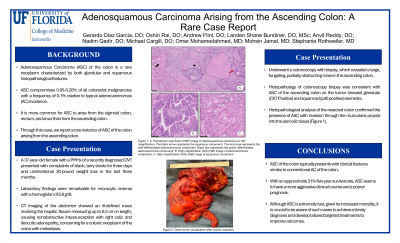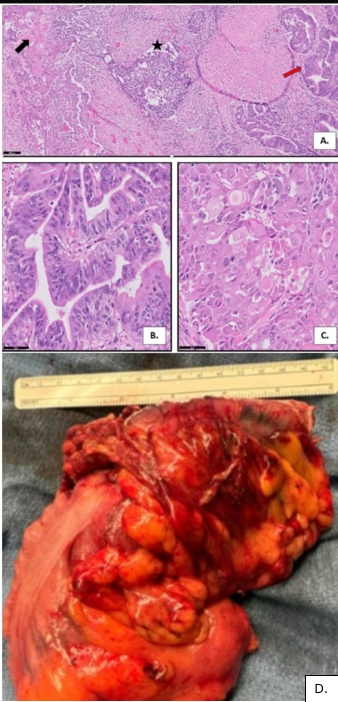Tuesday Poster Session
Category: Colon
P3740 - Adenosquamous Carcinoma Arising from the Ascending Colon: A Rare Case Report
Tuesday, October 29, 2024
10:30 AM - 4:00 PM ET
Location: Exhibit Hall E

Has Audio
- GD
Gerardo Diaz Garcia, DO
University of Florida College of Medicine
Jacksonville, FL
Presenting Author(s)
Gerardo Diaz Garcia, DO, Oshin Rai, DO, Andrew Flint, DO, Landen Shane Burstiner, DO, MSc, Anvit Reddy, DO, Nadim Qadir, DO, Michael Cargill, DO, Omer Mohamedahmed, MD, Mohsin Jamal, MD, Stephanie Rothweiler, MD
University of Florida College of Medicine, Jacksonville, FL
Introduction: Adenosquamous Carcinoma (ASC) of the colon is a rare neoplasm characterized by both glandular and squamous histopathological features. ASC compromises 0.05-0.20% of all colorectal malignancies with a frequency of 0.1% relative to typical adenocarcinomas (AC) incidence. Furthermore, it is more common for ASC to arise from the sigmoid colon, rectum, and anus than from the ascending colon. Through this case, we report a rare instance of ASC of the colon arising from the ascending colon.
Case Description/Methods: A 37-year-old female with a past medical history of a recently diagnosed deep venous thrombosis presented with complaints of black, tarry stools for three days and unintentional 20-pound weight loss in the last three months. Laboratory findings were remarkable for microcytic anemia with a hemoglobin of 8.8 g/dl. Computed tomography (CT) imaging of the abdomen showed an ill-defined mass involving the hepatic flexure measuring up to 6.5 cm in length, causing nonobstructive intussusception with right colic and ileocolic adenopathy, concerning for a colonic neoplasm of the colon with metastasis. The patient underwent a colonoscopy with biopsy, which revealed a large, fungating, partially obstructing mass in the ascending colon. Histopathology of colonoscopy biopsy was consistent with ASC of the ascending colon as the tumor showed glandular (CK7 Positive) and squamoid (p40 positive) elements. Colorectal surgery was consulted and performed complete tumor resection via a right hemicolectomy with ileocolic anastomosis. Histopathological analysis of the resected colon confirmed the presence of ASC with invasion through the muscularis propria into the pericolic tissue (Figure 1). The patient tolerated the surgery well and was discharged with a follow-up for hematology-oncology for further treatment.
Discussion: ASC of the colon typically presents with clinical features similar to conventional AC of the colon. Patients often present with abdominal pain, constipation, melena, and hematochezia. With an approximate 31% five-year survival rate, ASC seems to have a more aggressive clinical course and a poorer prognosis. This is likely due to the advanced presentation of the disease at the time of diagnosis and its poorly differentiated lesions when compared with AC. Although ASC is extremely rare, given its increased mortality, it is crucial to be aware of such cases to achieve a timely diagnosis and develop tailored targeted treatments to improve outcomes.

Disclosures:
Gerardo Diaz Garcia, DO, Oshin Rai, DO, Andrew Flint, DO, Landen Shane Burstiner, DO, MSc, Anvit Reddy, DO, Nadim Qadir, DO, Michael Cargill, DO, Omer Mohamedahmed, MD, Mohsin Jamal, MD, Stephanie Rothweiler, MD. P3740 - Adenosquamous Carcinoma Arising from the Ascending Colon: A Rare Case Report, ACG 2024 Annual Scientific Meeting Abstracts. Philadelphia, PA: American College of Gastroenterology.
University of Florida College of Medicine, Jacksonville, FL
Introduction: Adenosquamous Carcinoma (ASC) of the colon is a rare neoplasm characterized by both glandular and squamous histopathological features. ASC compromises 0.05-0.20% of all colorectal malignancies with a frequency of 0.1% relative to typical adenocarcinomas (AC) incidence. Furthermore, it is more common for ASC to arise from the sigmoid colon, rectum, and anus than from the ascending colon. Through this case, we report a rare instance of ASC of the colon arising from the ascending colon.
Case Description/Methods: A 37-year-old female with a past medical history of a recently diagnosed deep venous thrombosis presented with complaints of black, tarry stools for three days and unintentional 20-pound weight loss in the last three months. Laboratory findings were remarkable for microcytic anemia with a hemoglobin of 8.8 g/dl. Computed tomography (CT) imaging of the abdomen showed an ill-defined mass involving the hepatic flexure measuring up to 6.5 cm in length, causing nonobstructive intussusception with right colic and ileocolic adenopathy, concerning for a colonic neoplasm of the colon with metastasis. The patient underwent a colonoscopy with biopsy, which revealed a large, fungating, partially obstructing mass in the ascending colon. Histopathology of colonoscopy biopsy was consistent with ASC of the ascending colon as the tumor showed glandular (CK7 Positive) and squamoid (p40 positive) elements. Colorectal surgery was consulted and performed complete tumor resection via a right hemicolectomy with ileocolic anastomosis. Histopathological analysis of the resected colon confirmed the presence of ASC with invasion through the muscularis propria into the pericolic tissue (Figure 1). The patient tolerated the surgery well and was discharged with a follow-up for hematology-oncology for further treatment.
Discussion: ASC of the colon typically presents with clinical features similar to conventional AC of the colon. Patients often present with abdominal pain, constipation, melena, and hematochezia. With an approximate 31% five-year survival rate, ASC seems to have a more aggressive clinical course and a poorer prognosis. This is likely due to the advanced presentation of the disease at the time of diagnosis and its poorly differentiated lesions when compared with AC. Although ASC is extremely rare, given its increased mortality, it is crucial to be aware of such cases to achieve a timely diagnosis and develop tailored targeted treatments to improve outcomes.

Figure: Figure 1: A. Hematoxylin and Eosin (H&E) image of adenosquamous carcinoma at 10X magnification. The black arrow represents the squamous component. The red arrow represents the well-differentiated adenocarcinoma component. Black star represents the poorly differentiated adenocarcinoma component. B. High magnification (40X) H&E image of adenocarcinoma component. C. High magnification (40X) H&E image of squamous component. D. Gross tumor visualization of after colonic resection.
Disclosures:
Gerardo Diaz Garcia indicated no relevant financial relationships.
Oshin Rai indicated no relevant financial relationships.
Andrew Flint indicated no relevant financial relationships.
Landen Shane Burstiner indicated no relevant financial relationships.
Anvit Reddy indicated no relevant financial relationships.
Nadim Qadir indicated no relevant financial relationships.
Michael Cargill indicated no relevant financial relationships.
Omer Mohamedahmed indicated no relevant financial relationships.
Mohsin Jamal indicated no relevant financial relationships.
Stephanie Rothweiler indicated no relevant financial relationships.
Gerardo Diaz Garcia, DO, Oshin Rai, DO, Andrew Flint, DO, Landen Shane Burstiner, DO, MSc, Anvit Reddy, DO, Nadim Qadir, DO, Michael Cargill, DO, Omer Mohamedahmed, MD, Mohsin Jamal, MD, Stephanie Rothweiler, MD. P3740 - Adenosquamous Carcinoma Arising from the Ascending Colon: A Rare Case Report, ACG 2024 Annual Scientific Meeting Abstracts. Philadelphia, PA: American College of Gastroenterology.
